|
The Corbett Foundation Newsletter
END OF YEAR EDITION | DEC'23 |
|
|---|
|
www.corbettfoundation.org | info@corbettfoundation.org |
|
|
Dear readers,
We are pleased to present the end of year edition of The Corbett Foundation Newsletter. This has been a remarkable year with TCF implementing over 30 projects across 24 districts spread in 6 states of India.
These multidimensional projects focus on preserving the natural ecosystems and species and empowering local communities for the health and safety of both the planet and its people. In this issue, you can find updates about our ongoing projects in various landscapes, achievements of 2023, reports and publications we published this year and what is in the planning for the year to come.
We extend our deepest gratitude to all our supporters, donors, and well-wishers for your invaluable contributions. Your belief in our mission help fuels our determination to make a lasting impact on the conservation landscape.
Thank you and see you in 2024!
Warm regards,
The Corbett Foundation.
|
|
We have three new publications!
Click on the thumbnails to download a copy or scroll down further for details of the same. |
|
|---|
|
UPDATES FROM THE LANDSCAPES |
|
|---|
|
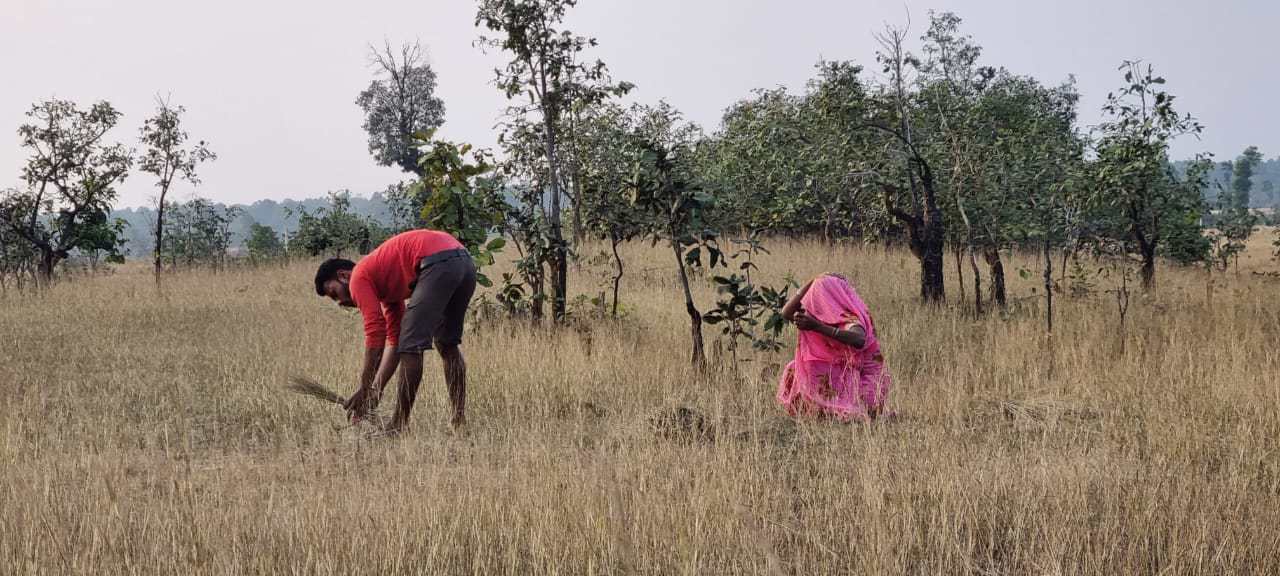 |
Over the last year, TCF has been involved in implementing the habitat restoration and cattle shed modifications initiatives in the Bandhavgarh landscape. With funding from Axis Bank and WestBridge Advisors LLP, we have planted over 180,000 saplings of indigenous species of plants over 290 hectares of degraded forest land in three restoration sites in the Bandhavgarh Sanjay Dubri Corridor. For the restoration, we ensured active engagement of local communities in various activities including seed planting and grass harvesting for stall-feeding of livestock. We also assessed the biodiversity at the restoration sites and have documented diverse mammal species such as Striped Hyena, Asiatic Wildcat, Indian Fox, Golden Jackal, Wild Boar and Indian Gazelle and bird species such as Shikra, Indian Grey Hornbill, White-eyed Buzzard, Long-tailed Shrike, Brahminy Starling, Ashy-crowned Sparrowlark, Plum-headed Parakeet, among many others, indicating the return of biodiversity. Tiger movement was also observed in the one of the restoration sites in October 2023, signifying the success of the restoration project. Under the cattle shed modification project supported by Exodus Travels Foundation, we modified 88 traditional cattle sheds by replacing the wooden components of the sheds with 7-foot cement poles and substituting the branches with chain-linked fences. These 88 sheds are in addition to 320 sheds modified between 2019 and 2022. It is estimated that these modifications have led to the conservation of 1,200 mature Sal trees in seven villages where TCF is actively engaged. Both habitat restoration and cattle shed modification projects aim to ensure long-term tiger conservation in the landscape while fostering climate resilience, vegetation replenishment, biodiversity restoration, water conservation, and mitigation of soil erosion caused due to deforestation.
TCF is grateful to the Axis Bank, WestBridge Advisors LLP, Exodus Travels Foundation and Madhya Pradesh Forest Department for the support and partnership, and looks forward to continued engagement in 2024 and beyond.
|
|
|---|
|
|
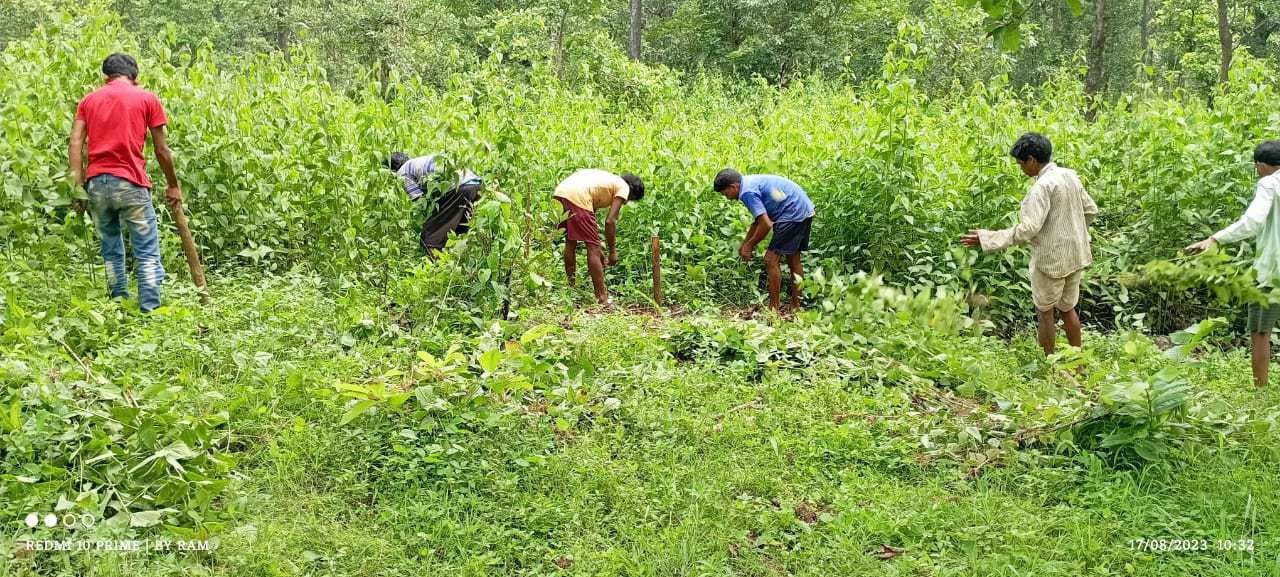 |
In 2023, TCF actively engaged in two impactful initiatives in the Kanha Tiger Reserve – the Habitat Restoration and Community Support project and the Holistic Human-Wildlife Conflict Mitigation Project. Supported by the PwC India Foundation and Born Free Foundation, UK, respectively, these projects aimed to address various aspects of human-wildlife conflict in the buffer zone of the reserve. Under the Habitat Restoration and Community Support project, TCF focused on sustainable green livelihoods, degraded land restoration, and fostering coexistence between humans and wildlife. Local self-help groups (SHGs) played a vital role, receiving resources for diversified income generation. TCF conducted awareness programs, workshops, and training sessions, commemorating conservation events. Since May 2022, the project successfully removed 45 ton of invasive lantana and planted 2800 saplings of indigenous plant species in 5 hectares. Additionally, TCF identified and trained 60 beneficiaries in honey cultivation, resulting in the production of "
Satghara Shahad." TCF also supported 20 women in establishing a backyard nursery, producing over 12,000 saplings of indigenous tree species In the Holistic Human-Wildlife Conflict Mitigation Project, TCF acquired 9.5 acres of land to grow fodder for stall-feeding of livestock and around 2.6 ton of grass has been harvested from the plantation sites 2022-2023.
This effort increased green fodder consumption, benefiting 71 out of 89 households. The project successfully cleared 10 acres of lantana, with the fenced area intended for communal stall feeding. High-milk yielding cows were provided, and 10 cattle shed floors were constructed, incorporating an innovative approach using urine as an organic pesticide.Veterinary check-ups treated 123 cases, demonstrating the positive impact of green fodder on animal health. TCF recorded and treated 22 cases of tiger/leopard attacks, mitigating human-wildlife conflict and preventing casualties. Regular awareness sessions and data analysis maintained community engagement and guided future implementations.
We express sincere gratitude to PwC India Foundation, Born Free Foundation, UK and Madhya Pradesh Forest Department for their valuable partnership in these endeavors, contributing to conservation and community well-being in the Kanha region.
|
|
|---|
|
|
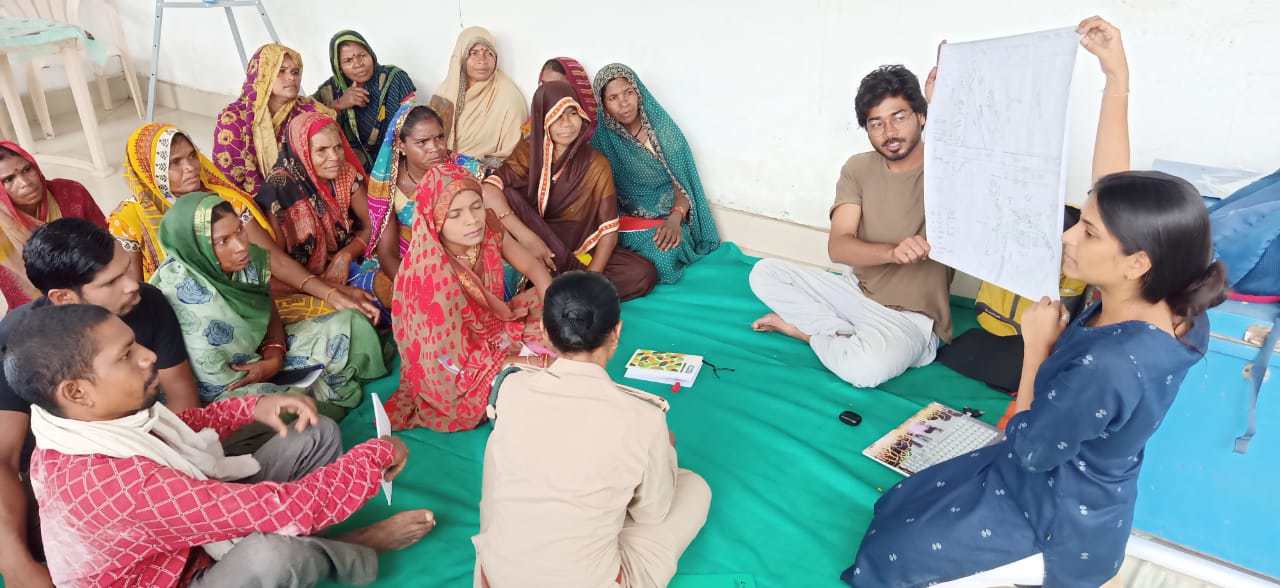 |
In 2023, TCF collaborated closely with Satpura Tiger Reserve (STR) to restore lantana-invaded forests in the STR-buffer area, with funding from The Nature Conservancy. Restoration efforts focused on removing invasive species, specifically lantana, and managing grasslands. TCF's interventions in 2023 contributed to the restoration of 1418 hectares across five buffer ranges: Bagda, Denwa, East Pachmarhi, Pipariya, and Tawa. Before implementing management interventions, systematic biodiversity assessments were conducted at each restoration site to establish a baseline for flora and fauna. The assessments revealed the presence of 52 tree species, 22 herbs/shrubs, and 28 grasses, along with 90 bird and 11 mammalian species. Additionally, 10 butterfly species were opportunistically recorded. TCF also collaborated with local communities, particularly through developing Microplans for Community Forest Management Committees (CFMCs) / Eco-Development Committees (EDCs). The teams engaged with over 27 EDCs/villages around the STR-buffer, understanding village profiles and issues, and involving community members in participatory processes to formulate mitigation/management strategies.Through Participatory Rural Appraisal (PRA) tools, TCF reached 30% of households (690 out of 2300) in the concerned villages, creating resource maps, venn diagrams, mobility maps, wealth ranks, livelihood calendars, crop calendars, etc. Conservation awareness initiatives were implemented in primary and middle schools through wildlife-themed competitions. TCF aimed to build capacity for microplanning by conducting workshops in two phases, targeting 50 EDCs. These workshops involved frontline staff, community members, and expert resource persons. The workshops covered the context, framework, and details about the structure and role of EDCs as institutional bodies in forest management and conservation. Other aspects of work in the landscape included assessing Social Forestry nurseries around Satpura Tiger Reserve, exploring skill enhancement opportunities, evaluating the status of human-wildlife conflict, and understanding the generic livelihood needs of local communities.
TCF is grateful to The Nature Conservancy and Satpura Tiger Reserve for their support and looks forward to continued engagement in 2024 and beyond.
|
|
|---|
|
|
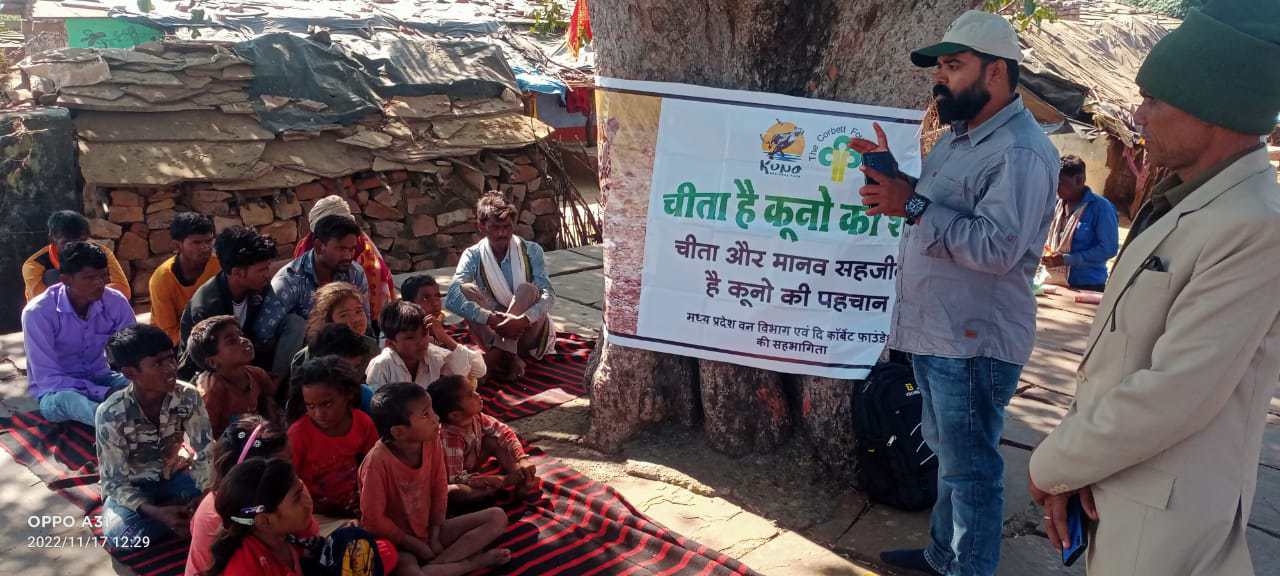 |
The Corbett Foundation (TCF) actively collaborated with the Madhya Pradesh Forest Department and communities around Kuno National Park with funding from Big Cat Rescue, USA and Ms. Devaki Jariwala to address human-wildlife conflict and raise awareness about cheetah and overall wildlife conservation. In the remote villages near the park, where access to electricity was non-existent, TCF distributed solar home lighting systems to 48 families. Alongside providing lighting solutions to the villagers, TCF closely worked with forest department to provide 120 solar lights to forest camps, 30 water storage tanks, 20 solar street lights at strategic locations inside Kuno National Park and engaged approximately with 100 forest department staff members in workshops over the past 12 months. TCF conducted comprehensive awareness programs, educating locals on cheetahs and wildlife conservation. Emphasizing the interdependence of forests, wildlife, and human well-being, TCF also shed light on government schemes like the Cattle Kills Compensation Scheme, aiming to reshape perceptions around human-wildlife conflicts and prevent retaliatory actions. Our commitment extends beyond traditional conservation efforts, emphasizing education, awareness, and community engagement to safeguard India's newest and fastest wild cat species.
We express sincere gratitude to Big Cat Rescue and Madhya Pradesh Forest Department for their valuable partnership in these endeavors, contributing to conservation and community well-being in Kuno.
|
|
|---|
|
|
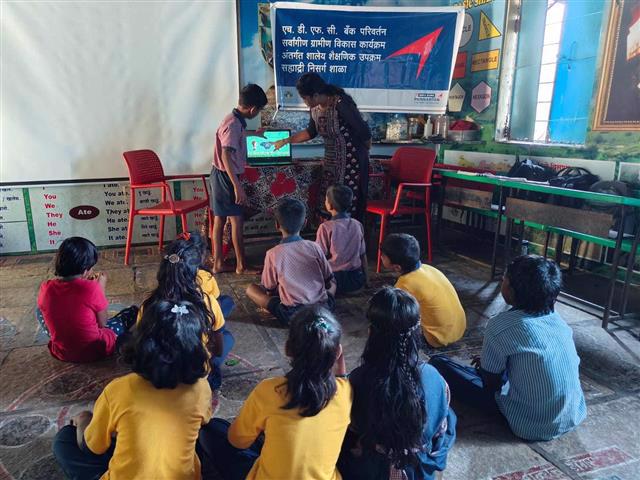 |
TCF, with funding from HDFC Bank – Parivartan, is implementing a Holistic Rural Development Programme in sixteen villages near Rajmachi and Lonavala conservation reserves, Pune District, Maharashtra, where collaborative activities were carried out in Education, Livelihood, and Natural Resource Management with various stakeholder groups. For younger stakeholders, a Nature Club was organized, conducting activities during wildlife week, including nature trails, classroom sessions, brochure distribution, drawing competitions, and film screenings. TCF has also improved Anganwadi and schoos by installing tiles, constructing railings, building compound walls, and providing interactive learning units aiming to create a conducive and secure environment for better learning outcomes. For women and community members in Self-Help Groups (SHGs), income generation training sessions were organized, focusing on ventures like chikki-ladoo, masala, and cloth bag-making. TCF collaborates with farmer groups, providing threshing machines for cost efficiency. In collaboration with the forest department, TCF initiated the construction of watchtowers for effective forest management and is fencing open wells to mitigate negative human-wildlife negative interactions. Ecological surveys documented local biodiversity, and TCF is constructing check dams, farm and forest ponds for water conservation and agricultural benefits. Furthermore, cattle vaccination drives prioritizing livestock health have been conducted too.
TCF also completed a two-day training program for the Forest Department's Frontline Staff in collaboration with the Pune Forest Department. The program covered the "Applications of Wildlife Tools and Techniques in Territorial Forest" and "Dealing with Offences under the Wildlife (Protection) Act 1972," enhancing collective knowledge and skills in wildlife conservation.
TCF is grateful to HDFC Bank and Maharashtra Forest Department for their support in the project implementation.
|
|
|---|
|
|
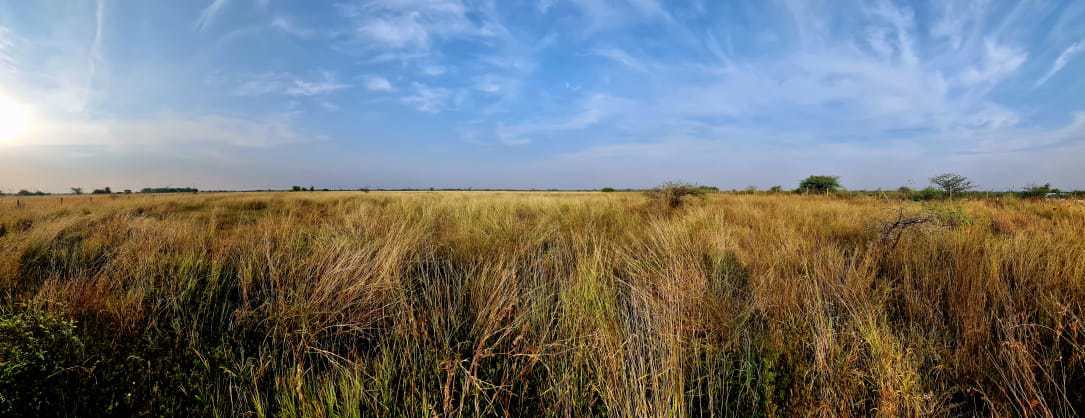 |
Anthropogenic activities and intensive agriculture have altered Earth's environment, impacting land use, climate change, and food production. In India, over 20 million ha of biodiverse grasslands have been converted to cropland, leading to a decline in species like the Great Indian Bustard. Critical grassland ecosystems are disregarded, compromising biodiversity and livelihoods. Invasion by species like Prosopis juliflora worsens the situation.
To address these issues in Abdasa tehsil of Kutch, Gujarat, TCF has successfully restored 52 acres of Prosopis juliflora-infested community grazing land. By engaging local villagers in scientific grassland management, removing invasive species, sowing local grass, and installing predator-proof fencing, over the last five years, the restored area has become a safe habitat, yielding around 2,000 kg of grass per hectare annually. Biodiversity assessments done on the project sites also revealed the presence of 70 bird species, 60 insect species, eight reptile species, and seven mammal species. The restoration not only conserves biodiversity but also offers an opportunity for Kutch's ecological rejuvenation. With stakeholder support, TCF aims to expand these efforts, promoting sustainable land management.
TCF is honoured to serve as a 'Subject Expert' for the Wildlife Division of Sasan-Gir, Gujarat Forest Department's project to deploy transmitters on birds for the satellite-telemetry study. This project began in September 2020 and the work continued through 2023. This project has added significant information on the movement patterns of around 50 individuals of 16 species of birds including floricans, vultures, harriers, cranes, flamingoes and grey hornbills. 'Unravelling the secreets of lesser florican: a study of their home range and habitat use in Gujarat, India' and 'Satellite Telemetry Insights into the Winter Habitat Use and Movement Ecology of Common and Demoiselle Cranes', were published in 2023 in reputed international journals.
TCF is grateful to Bombay Gow Rakshak Trust, The Habitats Trust, The Dharamsi Morarji Chemical Company Limited and Wildlife Division of Sasan-Gir, Gujarat Forest Department for their partnership and funding support for these projects.
|
|
|---|
|
|
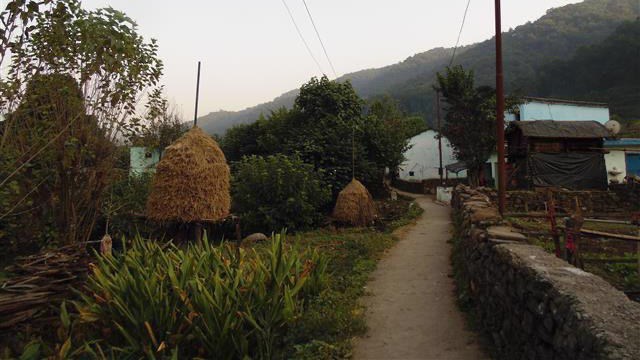 |
In 2023, TCF undertook a comprehensive array of initiatives with support from DMCC Speciality Chemicals Ltd and H T Parekh Foundation, within the Corbett landscape, addressing critical conservation challenges and fostering sustainable development in local communities. To combat crop depredation and mitigate negative human wildlife interaction in the North Zone of Corbett Tiger Reserve (CTR), TCF installed 1-km of chain-link fencing in fringe villages benefiting 580 villagers. We also distributed 300 iron poles across ten villages with the goal of promoted eco-friendly haystack construction with iron poles and reducing reliance on forest trees. Additionally, we also installed 30 solar-powered street lights in Khaani and Ranikota villages, enhancing visibility and minimizing negative human-wildlife encounters. To support economic upliftment of the communities, we provided 16 crossbred cows in Kotabagh and established spice processing units for economic upliftment. Poultry farming initiatives empowered villagers, reducing dependency on agriculture and promoting sustainable alternatives. The Rural Medical Outreach Programme provided health services to approximately 145 villages.
Lastly, TCF continued the implementation of the Interim Relief Scheme in collaboration with WWF-India, addressing 397 cases of livestock depredation and two human injury cases. These efforts garnered community support, contributing to wildlife research and protection. In addition to working with communities, TCF also actively collaborates with Uttarakhand Forest Department in the landscape and routinely organises and conducts workshops and capacity buildling programmes. Our engagment in 2023 included anti-poaching and legal training, equipping field patrolling teams, and conducting health awareness programs, nature guide training workshops and participation in post-mortem examinations of wild animals.
TCF extends gratitude to DMCC Speciality Chemicals Ltd, H T Parekh Foundation, WWF-India and Uttarakhand Forest Department for their invaluable collaboration and support.
|
|
|---|
|
|
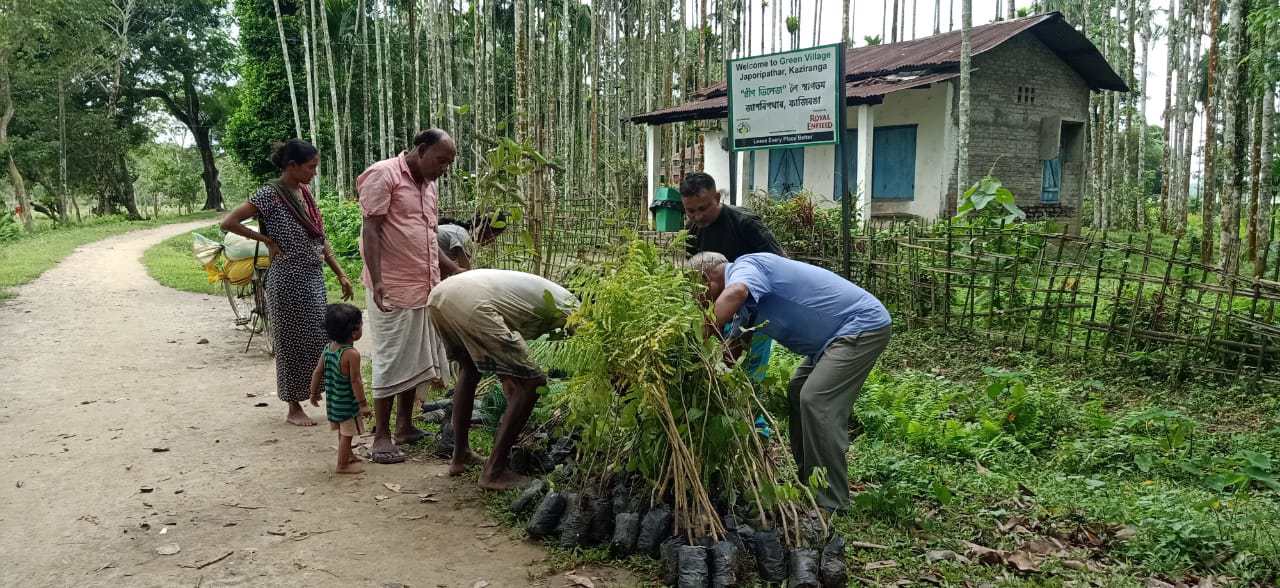 |
The TCF Kaziranga division has undertaken a comprehensive array of initiatives geared towards diverse conservation objectives. With a strong commitment to community empowerment and fostering stewardship for conservation, TCF Kaziranga has orchestrated education and awareness programs targeting various stakeholder groups, particularly on occasions such as World Rhino Day and Wildlife Week. These programs are designed to enhance understanding and engagement in conservation efforts. Furthermore, teams on the ground have forged partnerships with educational institutions and the Kaziranga Tiger Reserve to organize a bi-weekly clean-up drive within the park, contributing to the preservation of this vital ecosystem. TCF has also established collaborations with local community members to support tree plantation initiatives, with the active participation of youth, local women, and college students in these activities. In order to reduce negative human-wildlife interactions, TCF is implementing a cattle shed modification project in and around Kaziranga. Traditional cattle sheds are being upgraded with chain-linked fences to prevent depredation by large carnivores, with support from certain members of the state forest department. Over 2022-2023, TCF installed 70 Tongis or modified watch towers equipped with powerful torchlights in paddy fields.
Additionally, starting from November 2023, TCF Kaziranga has initiated an insect study to document the insect diversity in the region. This study contributes to a more comprehensive understanding of the ecological dynamics in Kaziranga and aligns with their broader conservation efforts. The organization's multifaceted approach underscores their commitment to holistic conservation and engagement with the local community.
|
|
|---|
|
|
ROADSIDE SIGN BOARD INSTALLATIONS |
|
|---|
|
The Corbett Foundation installed 13 roadside boards in the areas that are connected to the Corbett Tiger Reserve. These areas serve as essential wildlife corridors, supporting the movement of wild animals between Corbett Tiger Reserve, Kosi River, and Ramnagar Forest Division. Unfortunately, accidents involving wild animals are also frequently seen due to the high speed of vehicles travelling in these corridors. Additionally, the issue of litter thrown by tourists in forest areas poses a threat to wildlife, as these creatures are often seen feeding on this litter.
In response to these challenges related to safeguarding the wildlife corridor's habitat in the Corbett Tiger Reserve, TCF has taken the proactive step of installing reflective signboards. The primary objective of these boards is to serve as a warning to both drivers and tourists, urging them to exercise caution by reducing their speed within these wildlife corridors and refraining from littering the forested areas.
|
|
|
In Kaziranga, the issue of feeding wildlife posed a growing threat to the delicate balance of the ecosystem. Tourists, unaware of the consequences, often fed animals along the national highway, disrupting natural behaviors and endangering both the animals and themselves. Recognizing the urgency of the matter, the Forest Department, in collaboration with TCF, initiated a campaign to address this concern. Despite being his retirement day, the dedicated DFO of Kaziranga personally spearheaded the installation of a "No Feeding" signboard around a temple area on the national highway. The DFO also engaged the local pujari, shopkeepers, and his Range Officer, emphasizing the importance of wildlife conservation.
The signboard aimes to raise awareness among locals and tourists alike about the adverse effects of feeding wildlife and serves as a visual reminder of the need to respect the natural behaviors of animals and contribute to the overall well-being of the ecosystem.
|
|
|---|
|
|
KIDS FOR TIGERS PROGRAMME |
|
|---|
|
In association with Sanctuary Nature Foundation, TCF initiated the 'Kids for Tigers Programme' in the periphery of Bandhavgarh and Kanha tiger reserves, which included awareness programs and field sessions in more than 30 schools in an attempt to inculcate awareness among school kids towards tiger and biodiversity conservation. |
|
|---|
|
TRUSTEE'S MEETING @ BANDHAVGARH |
|
|---|
|
Earlier this month TCF team had the opportunity to take our esteemed trustees to visit one of our restoration sites in the Bandhavgarh Sanjay Dubri Corridor after the annual trustee's meeting held in the landscape. |
|
|---|
|
ELEPHANT DAY (KAZIRANGA & CORBETT) |
|
|---|
|
INTERNATIONAL VULTURE AWARENESS DAY |
|
|---|
|
WORLD WETLANDS DAY AND BIRD FESTIVAL |
|
|---|
|
Mr. Kedar Gore, the Director of TCF was honored with the prestigious Sanctuary Wildlife Service Award 2023. His passion for wildlife conservation has not only shaped the ethos of our organization but has also served as an inspiration to all those who are part of the TCF family. Mr. Gore's leadership has been a driving force behind TCF's success, and we are incredibly proud to have him at the helm. His ability to inspire, innovate, and lead by example has propelled TCF to new heights, and this award is a well-deserved acknowledgment of his significant contributions to the field of wildlife conservation.
|
|
|
|
|
The support provided for conservation efforts in the Terai-West Forest Division, Ramnagar by Dr. Harendra Singh Bargali and Ms. Deepti Patwal from TCF's Corbett team was officially recognized and appreciated. This acknowledgment was conveyed during a Wildlife Week celebration where the honorary Member of Legislative Assembly (MLA), Shri Diwan Singh Bisht, and Shri P.K. Patro, Chief Conservator of Forests, Kumaon Region, Uttarakhand Forest Department, presented an appreciation letter.
|
|
|
|
|
Dr. Naveen Pandey, Deputy Director of The Corbett Foundation received the Best Oral Presentation Award at the Indian Institute of Technology, Guwahati during the National Conference on Gau-Vigyan in Modern Life and Medical Science. TCF's paper titled 'Incorporating Ethnographic Techniques for One Health Research in Rural India' was recognized for its outstanding contribution.
|
|
|
|
|
Mr. Ankit Kachhwaha from TCF's Kuno team was awarded a certificate of appreciation from the Kuno Wildlife Division, Sheopur for his efforts in supporting the department officials in Cheetah monitoring and patrolling. Since November 2022, TCF has been actively engaging with the Madhya Pradesh Forest Department and the communities in about 50 villages surrounding Kuno National Park to support effective monitoring, address negative human-wildlife interactions, and raise awareness about the Cheetahs in the region.
|
|
|
|
|
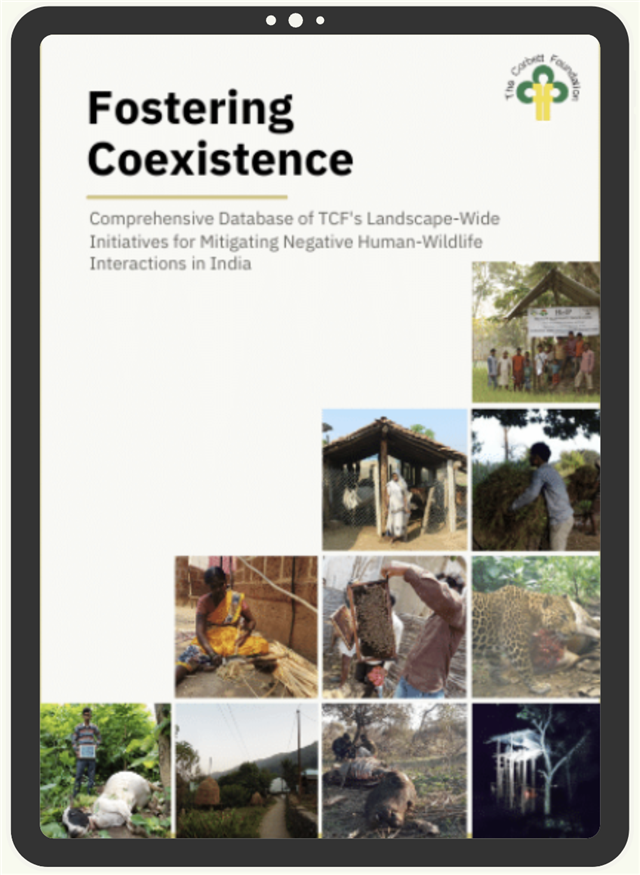 |
Negative interactions between humans and wildlife is regarded a crucial conservation challenge globally. With human and wildlife interacting more closely than ever, the potential for perilous encounters has increased exponentially. TCF has dedicated 30 years to fostering peaceful coexistence in all our landscapes of operation through sustainable solutions that protect both the wildlife and the people living in the vicinity of the forests. Our initiatives emphasize livelihood support, offering alternative incomes to reduce dependency on wildlife-attracting resources. The report also delves into our efforts in immunization and disease prevention, mitigating the risk of disease transmission between humans and nature.
This year we published a compilation of the best mitigation strategies and initiatives implemented by TCF over the last three decades in form of a report 'Fostering Coexistence' that encapsulates TCF's approach, addressing root causes and identifying strategic interventions applicable across diverse landscapes. The document highlights initiatives like installation of mitigative infrastructures solar fences and traditional watchtowers as well as building capacities of stakeholders by empowering local communities and forest department staff.
Click here to download a copy.
|
|
|---|
|
|
The Asian elephant, with its majestic presence and cultural significance in the Indian subcontinent, holds a unique place in our hearts. This collection of insights and research underscores the crucial role of conserving these magnificent creatures. Amid urbanisation, habitat loss, conflicts, and poaching, this volume unites experts from across the region to unravel the intricate relationships between humans and elephants. From scientific studies to cultural examinations, it delves into the challenges and potential solutions for their survival.
As we navigate a changing world, this compilation urges us to honour tradition, embrace innovation, and collectively safeguard the Asian elephant's heritage and future.
Click here to download a copy
|
|
|---|
|
|
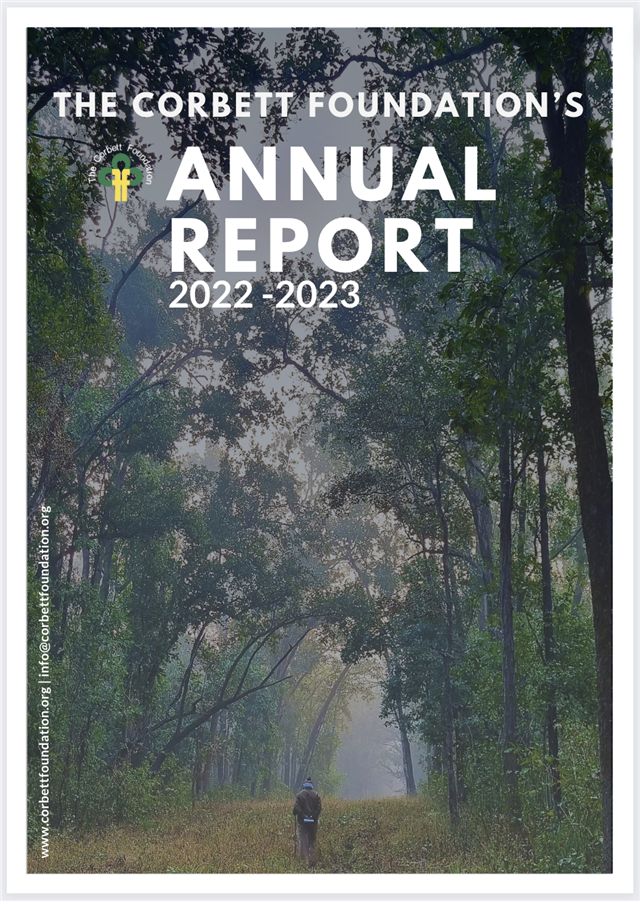 |
We are thrilled to unveil The Corbett Foundation's Annual Report for the financial year 2022-2023! Delve into the pages and discover the incredible strides we've made towards fostering human-wildlife coexistence.
This year has been marked by significant achievements and milestones, thanks to our dedicated team, partners, and stakeholders. From protecting threatened species to promoting sustainable development in communities, TCF's impact is both powerful and positive. Our projects embody intersectionality and inclusivity, bringing diverse stakeholders together for a common conservation goal. None of this would be possible without the passion and tireless commitment of our incredible supporters, donors, and well-wishers.In the face of conservation challenges, TCF remains steadfast in preserving biodiversity and fostering harmony. As we reflect on the past year, we're mindful of the work that lies ahead. TCF will continue to adapt and evolve, striving for innovative solutions to address conservation challenges daily! To all our supporters, donors, and well-wishers, your belief in our mission fuels our determination to make a lasting impact. We extend our deepest gratitude for your invaluable contributions. You are invited you to explore the pages of this report, capturing the essence of our journey and the positive changes we're collectively bringing about. The Corbett Foundation remains committed to creating a world where wildlife thrives, and communities coexist harmoniously with nature.
To download a copy, please click here.
|
|
|---|
|
|
Mrs. Rina D. Khatau:
Chairperson
Mr. B. K. Goswami,
IAS
(Retd.)
Dr. M. K. Ranjitsinh,
IAS (Retd.)
Mr. Nirmal Ghosh
Mr. Sam Mistry
Mr. Akshobh Singh |
|
|
Mr. Darius E. Udwadia
Mr. Prabhu Rajkotia
Mr. Laxmikumar N. Goculdas
Dr. Divyabhanusinh Chavda
Mr. Atul C. Kirloskar
Mr. Gautam D. Khatau |
|
|---|
|
SCIENTIFIC ADVISORS
Dr. AJT Johnsingh and Dr. Asad R. Rahmani
|
|
Contact Us At
Tel: +91 22 61466400 / 61466417
|
|
The Corbett Foundation is a charitable trust registered under the Indian Trusts Act, 1882. It is also registered under the Foreign Contribution (Regulation) Act, 1976 under registration number 231650853 and the Ministry of Corporate Affairs for CSR under registration number CSR00000183. The donations to The Corbett Foundation are tax exempt u/s 80G of the Income Tax Act, 1961. The Corbett Foundation is accredited by Credibility Alliance under the Desirable Norms prescribed for Good Governance of Voluntary Organisations.
NITI Aayog ID: UA/2017/0179126 |
|
|---|
|
|
|
 | |
|  |
|
|
|
|


